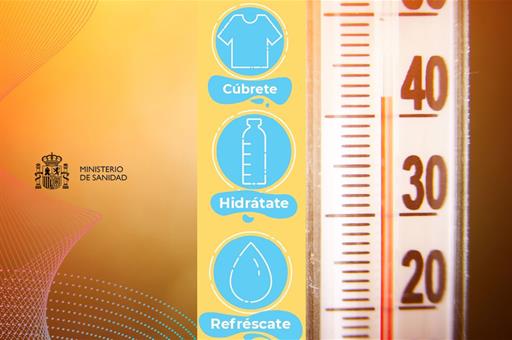The State Meteorology Agency (AEMET) announced last Sunday 10 July, the beginning of a heat wave in the Peninsula, which will lead to a gradual and progressive increase in temperatures until at least next Thursday 14 July. The peak of the heatwave is likely to be between today, Tuesday 12 July, and next Thursday 14 July.
Hot days force the human body to make an adaptive effort to maintain normal body temperature. Excessive heat can disrupt our vital functions when the body is unable to compensate for variations in body temperature and can lead to problems such as sunstroke or heat exhaustion, and it can even aggravate existing pathologies.
The Ministry of Health is keeping active the National Plan of Preventive Actions against the effects of excessive temperatures on health, through which information is provided to the different agents involved in the plan to prevent and reduce the negative effects of heat on health, especially among the most vulnerable groups such as the elderly, pregnant women, minors and people with chronic illnesses, as well as people who work or do strenuous activities outdoors.
To minimise the damage to health caused by excessive temperatures, the Ministry of Health has issued a list of ten general recommendations:
1. Drink water and fluids frequently, even if you do not feel thirsty and regardless of your physical activity.
2. Avoid caffeinated, alcoholic or highly sweetened beverages, which can promote dehydration.
3. Although anyone can suffer from a heat-related problem, pay special attention to babies and young children, pregnant or breastfeeding mothers, elderly people and people with illnesses that can be aggravated by heat (those with heart disease, kidney disease, diabetes, hypertension, obesity, cancer, pathologies that hinder mobility, dementia and other mental illnesses, and those that abuse drugs or alcohol).
4. Stay as far as possible in cool, shady or air-conditioned places, and cool down as needed.
5. Try to reduce physical activity and avoid outdoor sports in the middle of the day.
6. Wear light, loose-fitting, breathable clothing.
7. Never leave anyone in a parked and locked vehicle (especially minors, the elderly and chronically ill people).
8. Consult your health care professional for symptoms that last more than an hour and may be related to high temperatures.
9. Keep your medicines in a cool place; heat can alter their composition and effects.
10. Eat light meals to help replenish salts lost through sweating (salads, fruit, vegetables, juices, etc.).
All information on the National Plan, as well as information on risk levels, can be found on the Ministry of Health website.
A free Temperature and Risk Level Subscription Service is also available to citizens, through which they can receive an email and/or SMS with daily information on the temperatures and risk levels of the provinces that are of interest to them via this link.
Non official translation





